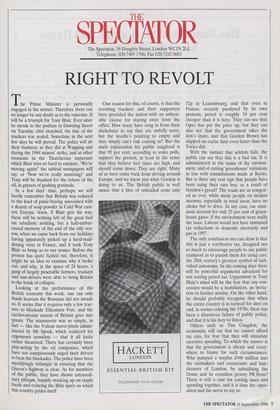SPECIATOR
The Spectator, 56 Doughty Street, London WC1N 2LL Telephone: 020-7405 1706; Fax 020-7242 0603
RIGHT TO REVOLT
In a few days' time, perhaps, we will hardly remember that Britain was reduced to the kind of panic-buying associated with a dearth of soap powder in Cold War east- ern Europe. Soon, if Blair gets his way, there will be nothing left of the great fuel tax rebellion; nothing, but a half-embar- rassed memory of the end of the silly sea- son, when we came back from our holidays having apparently picked up a herd-mad- dening virus in France, and it took Tony Blair to bring us to our senses. Before the protest has quite fizzled out, therefore, it might be an idea to examine why it broke out, and why, in the space of 24 hours, a gang of largely peaceable farmers, truckers and taxi-drivers were able to bring Britain to the brink of collapse.
Looking at the performance of the British economy this week, one can only thank heavens the Russians did not invade us. It seems that it requires only a few trac- tors to blockade Ellesmere Port, and the cardiovascular system of Britain goes into spasm. The manoeuvre was so simple, in fact — like the Vulcan nerve-pinch admin- istered by Mr Spock, which rendered his opponents senseless — that it all looks rather theatrical. There has certainly been play-acting by the oil companies, which have not conspicuously urged their drivers to beat the blockades. The police have been mystifyingly lethargic in ensuring that the Queen's highway is clear. As for members of the public, they have shown extraordi- nary phlegm, happily stocking up on staple foods and evincing the Blitz spirit on which this country prides itself. One reason for this, of course, is that the revolting truckers and their supporters have provided the nation with an unbeat- able excuse for staying away from the office. How many have rung in from their deckchairs to say they are awfully sorry, but the needle's pointing to empty and they simply can't risk coming in? But the main explanation for public sangfroid is that 95 per cent, according to some polls, support the protest, at least in the sense that they believe fuel taxes are high, and should come down. They are right. Many of us have come back from driving around- Europe, and we know just what Gordon is doing to us. The British public is well aware that a litre of unleaded costs only 52p in Luxembourg, and that even in France, recently paralysed by its own protests, petrol is roughly 10 per cent cheaper than it is here. They can see that Opec has put the price up, but they can also see that the government takes the lion's share, and that Gordon Brown has slapped on excise duty even faster than the Tories did.
With the instinct that seldom fails, the public can see that this is a bad tax. It is administered in the name of the environ- ment, and of cutting 'greenhouse' emissions in line with commitments made at Kyoto. But is there any real sign that people have been using their cars less, as a result of Gordon's greed? The roads are as congest- ed as ever, while many people on modest incomes, especially in rural areas, have no choice but to drive. In any case, car emis- sions account for only 25 per cent of green- house gases: if the environment were really the issue, Labour would not have instituted tax reductions in domestic electricity and gas in 1997.
The only conclusion one can draw is that this is just a retributive tax, designed not so much to encourage people to use public transport as to punish them for using cars, the 20th century's greatest symbol of indi- vidual autonomy. In the coming days there will be powerful arguments advanced for not cutting petrol tax. Uppermost in Tony Blair's mind will be the fear that any con- cession would be a humiliation, an invita- tion to further mutiny. On the other hand, he should probably recognise that when the entire country is in turmoil for days on end, in scenes echoing the 1970s, there has been a disastrous failure of public policy, and that it is his duty to listen.
Others such as Tim Congdon, the economist, will say that we cannot afford tax cuts, for fear that they will stimulate excessive spending. To which the answer is that the government is always and every- where to blame for such circumstances. Who pumped a surplus £940 million into the suitmakers and restaurants and hair- dressers of London, by subsidising the Dome and its countless groovy PR firms? There is still a case for cutting taxes and spending together, and it is time the oppo- sition had the nerve to say so.


































































 Previous page
Previous page